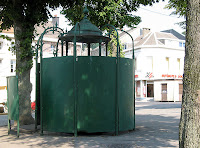This morning the papers are full of the devastation wrought by the fierce storm that ripped through the region early Sunday morning. Many people are dead and injured and there has been much damage to property. It might have been a lot worse had there not been considerable warning time. Posters were up around the La Rochelle harbour on Saturday afternoon warning people not to park near the water. Totally disregarding these warnings, we set out for a concert in Rochefort, about 40 km away, only to discover it was cancelled because of the storm. We were bemused as the weather then was mild and calm. When the 150 km gusts began screaming down the street, we were very glad to be safely at home! The only damage we noticed from our window was the complete devastation of the dubious deck of les gars. The whole thing is now a pile of lumber, sitting in a jumble on top of their roof proving the dodginess of the construction.
We had to work hard to participate in the Olympic Games. Because of the time difference, nearly all the competitions were in the early morning hours, 1-4 AM, so seeing it live wasn't really an option. We followed on French TV, feeling grumpy and out of it. We must quickly say that their coverage was extensive and well done, beginning every evening around 8 PM with at least 3 commentators for each event. The problem for us was that they gave the most coverage to French athletes. Quite right too, but it left us in the dark about the Canadians. What a slice of culture! The commenting was quite different from what we are used to, full of hyperbole and Gallicisms. David cracked up every time he heard: "Oooh, la, la, la, la!" They were fiercely nationalistic: all French athletes were potential winners. But when they began to drop behind, the comments became mercilessly critical. Poor Brian Joubert, the figure skating champion, fell in his short program. Before we knew it, he was totally discounted and was being called " une humiliation totale pour la France". Poor guy, he might have picked up in the long program had he had some support!
We were frustrated to discover that the TV channels, CTV and NBC, streaming video in North America prohibited anyone from anywhere else from tuning in. So even the computers seemed useless. The official Olympic WEB site offered statistics but were slow in updating. At last, Mr. Technician solved our problem! David, after endless searching, found an HD channel internet feed to Europe that had live and recorded versions of almost everything. No commentary and it stopped every 15 minutes for a GE
commercial . . . aaargh . . . the same one, over and over but now we were able to see what was happening.
So by the second week we were with the Canadian team, cheering them on and feeling very proud. There didn't seem to be a lot of interest in La Rochelle. The sports pages of the local newspaper had football and rugby for several pages before a one page coverage of the J.O (Jeux Olympiques). The man who runs the local health food store explained to me that the rochelais are far keener on the sports of summer. The other customer in the store agreed. But I reminded them of their great skiers of the 60s and 70s and they admitted that things have gone downhill (my pun, not theirs)!! They were amazed to discover that Canada's population is so small and remarked that we had done even better than they had thought. Ludovic, the manager at Women Fitness, has been watching a lot and seems quite delighted to let me know how pleased he has been to see Canada winning so many gold medals. And our new French teacher, Sylvie, was making jokes like ours about the language of the French commentators.
The ice hockey game last night was a wonderful finish and here the commentators were lovely. With no French team to cheer on, they took on the Canadians with enormous enthusiasm. There was little attempt to be neutral as they explained that they would cheer for "les cousins". With them was Roch Voisine who turned out to be a real hockey enthusiast and did a great job explaining and revving up the spirits. All three men enthusiastically explained hockey's place in Canadian life, telling people that all over Canada there were crowds like the ones inside and outside the Vancouver rink. And there was our little 'crowd' of two, groaning and cheering. Great fun and a proud moment!




